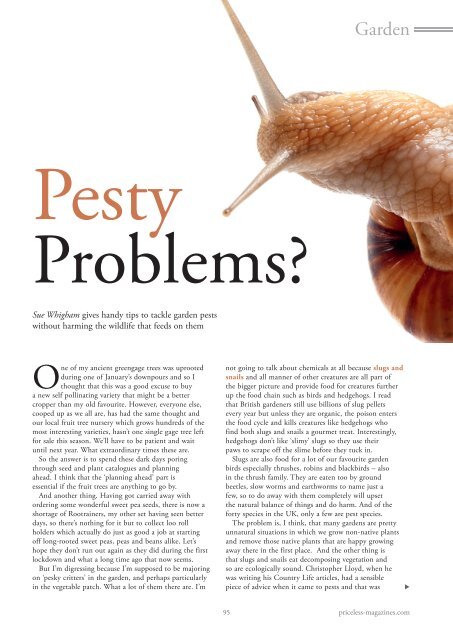Wealden Times | WT226 | March 2021 | Interiors supplement inside
Wealden Times - The lifestyle magazine for the Weald
Wealden Times - The lifestyle magazine for the Weald
Create successful ePaper yourself
Turn your PDF publications into a flip-book with our unique Google optimized e-Paper software.
Garden<br />
Pesty<br />
Problems?<br />
Sue Whigham gives handy tips to tackle garden pests<br />
without harming the wildlife that feeds on them<br />
One of my ancient greengage trees was uprooted<br />
during one of January’s downpours and so I<br />
thought that this was a good excuse to buy<br />
a new self pollinating variety that might be a better<br />
cropper than my old favourite. However, everyone else,<br />
cooped up as we all are, has had the same thought and<br />
our local fruit tree nursery which grows hundreds of the<br />
most interesting varieties, hasn’t one single gage tree left<br />
for sale this season. We’ll have to be patient and wait<br />
until next year. What extraordinary times these are.<br />
So the answer is to spend these dark days poring<br />
through seed and plant catalogues and planning<br />
ahead. I think that the ‘planning ahead’ part is<br />
essential if the fruit trees are anything to go by.<br />
And another thing. Having got carried away with<br />
ordering some wonderful sweet pea seeds, there is now a<br />
shortage of Rootrainers, my other set having seen better<br />
days, so there’s nothing for it but to collect loo roll<br />
holders which actually do just as good a job at starting<br />
off long-rooted sweet peas, peas and beans alike. Let’s<br />
hope they don’t run out again as they did during the first<br />
lockdown and what a long time ago that now seems.<br />
But I’m digressing because I’m supposed to be majoring<br />
on ‘pesky critters’ in the garden, and perhaps particularly<br />
in the vegetable patch. What a lot of them there are. I’m<br />
not going to talk about chemicals at all because slugs and<br />
snails and all manner of other creatures are all part of<br />
the bigger picture and provide food for creatures further<br />
up the food chain such as birds and hedgehogs. I read<br />
that British gardeners still use billions of slug pellets<br />
every year but unless they are organic, the poison enters<br />
the food cycle and kills creatures like hedgehogs who<br />
find both slugs and snails a gourmet treat. Interestingly,<br />
hedgehogs don’t like ‘slimy’ slugs so they use their<br />
paws to scrape off the slime before they tuck in.<br />
Slugs are also food for a lot of our favourite garden<br />
birds especially thrushes, robins and blackbirds – also<br />
in the thrush family. They are eaten too by ground<br />
beetles, slow worms and earthworms to name just a<br />
few, so to do away with them completely will upset<br />
the natural balance of things and do harm. And of the<br />
forty species in the UK, only a few are pest species.<br />
The problem is, I think, that many gardens are pretty<br />
unnatural situations in which we grow non-native plants<br />
and remove those native plants that are happy growing<br />
away there in the first place. And the other thing is<br />
that slugs and snails eat decomposing vegetation and<br />
so are ecologically sound. Christopher Lloyd, when he<br />
was writing his Country Life articles, had a sensible<br />
piece of advice when it came to pests and that was <br />
95 priceless-magazines.com


















